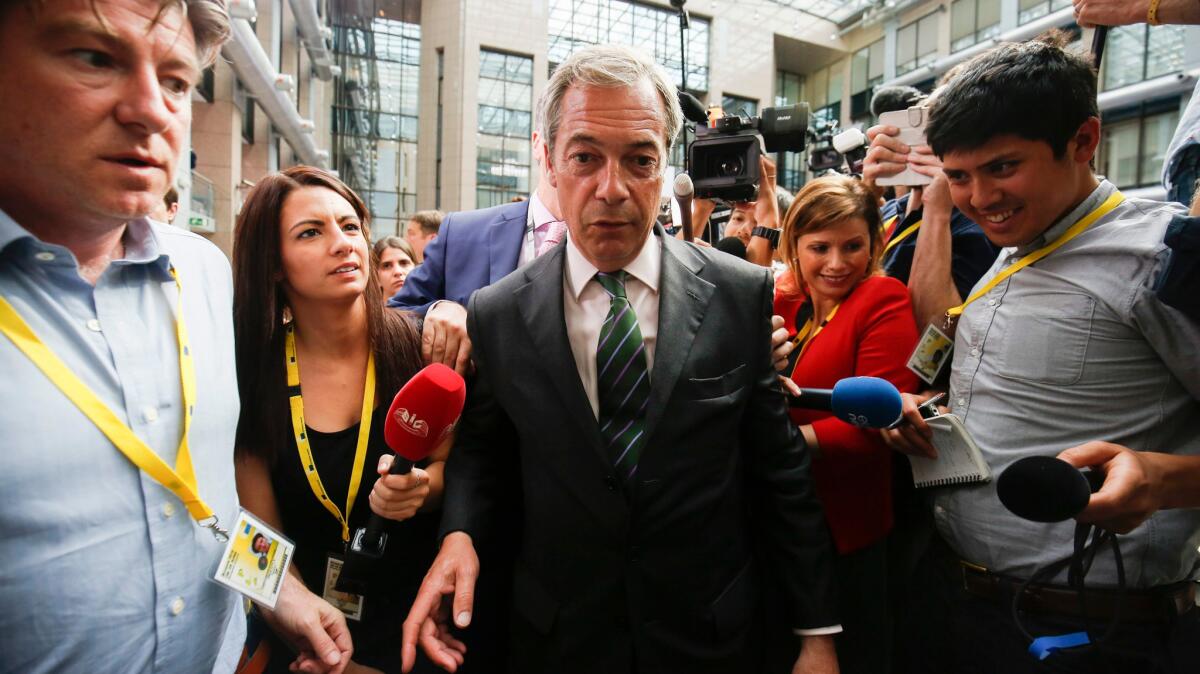Op-Ed: What Trump and the Brexiteers have in common

Does last week’s British vote to leave the European Union presage victory for Donald Trump? The presumptive Republican presidential nominee certainly seems to think so. At an auspiciously timed visit to his Scottish golf resort the day after the referendum, Trump told reporters that, like his campaign, “Brexit” shows how “people want to take their country back.”
Whether or not he can beat Hillary Clinton, Trump and Brexiteers have struck similar populist chords – namely, unease with globalization, immigration and elites. There’s also a deeper, and deeply worrying, phenomenon connecting the two: an utter disregard for facts. Call it “post-truth politics.”
The case for Brexit was predicated on three deceptions: that the EU threatens British democracy, destroys the country through unlimited immigration and holds back its economic potential.
On the campaign trail, Brexiteers frequently claimed that 60% or more of British laws are written by EU bureaucrats. Like Trump’s insistence that he personally witnessed “thousands and thousands” of people in New Jersey cheering the destruction of the World Trade Center after 9/11, this is false. It’s difficult to put a precise figure on the percentage of British legislation originating from Brussels, the seat of the EU government. (How does one measure, for instance, a book-size national healthcare bill written and passed by British parliamentarians alongside a three-page EU directive on harmonizing laws against tax fraud?) Nonetheless, a study by the nonpartisan House of Commons Library found that 13.2% is more accurate.
Cognizant that EU rules concerning the shape of bananas – a perennial Europhobic talking point – might not be enough to force a Brexit, proponents sold the regulatory issue as a patriotic one. They told Brits to “take back control” and deployed buzzwords such as “independence” and “sovereignty” as if they were latter-day American revolutionaries. As a longtime observer of British politics, I was dumbfounded watching this debate unfold. That’s because the Brits – unlike, say, their neighbors across the English Channel – have an instinctive dislike for fuzzy abstractions and a low tolerance for bull. That old saw about the Frenchman who asks, “It works in practice, but does it work in theory?” can now, sadly, be applied to Englishmen as well.
When it comes to immigration, Trump and the Brexiteers have similarly promoted emotional appeals over cold facts. The enthusiastic response Trump receives whenever he repeats his mantra about building a wall along the Southern border is mystifying when one considers that more Mexicans have left the U.S. over the past five years than have entered it. In their effort to stigmatize immigration, Brexit supporters deceitfully conflated migrants coming from fellow EU member states – who are allowed, like British citizens, to travel and work freely throughout the Union – with those hailing from outside the EU.
Nine out of 10 economists said that Brexit would hurt British growth over the next five years.
In the campaign’s lowest moment, UK Independence party leader Nigel Farage unveiled a poster depicting a stream of dark-skinned refugees under the banner “Breaking Point,” the implication being that Britain will be swarmed with some of the roughly 1 million Middle Eastern and African migrants who have entered the continent since 2015. But while Britain enjoys the benefits of EU freedom of movement, it is not a member of the Schengen Area, the EU’s internal, border-free zone. This means it can deny admittance to any non-EU citizen attempting to enter from the continent. Far from having “lost control” over its borders, Britain actually has the best of both worlds.
Finally, nine out of 10 economists said that Brexit would hurt British growth over the next five years due to the uncertainty engendered by a departure from the EU single market, where British industry and finance have operated freely for the past four decades. More than 80% of economists, meanwhile, predicted a negative impact from Brexit on household incomes. It is rare that one ever gets this sort of unanimity from economists on any single question, let alone the whole bundle of questions implicated by something so complex as a country’s membership in a supranational economic union.
Confronted with these facts, however, Brexiteers didn’t wage much of a counter-argument. “People in this country have had enough of experts,” declared Justice Secretary Michael Gove, a leading Brexit advocate, going so far as to compare said economists to the “German authorities” who slandered Albert Einstein’s theorems on account of his being Jewish. Gove’s defiant anti-intellectualism sounds a lot like the post-modernist ramblings of Trump surrogate Jeffrey Lord, who, on CNN, recently derided the practice of fact-checking itself as an “out-of-touch, elitist media-type thing. I don’t think the people out in America care.”
In light of last week’s vote, it’s fair to say that a large number of British people don’t. Let’s hope that those of us on this side of the pond, whether we live on the coasts or “out in America,” do.
James Kirchick is filling in for Doyle McManus. He is a fellow with the Foreign Policy Initiative and his book, “The End of Europe,” is forthcoming from Yale University Press. Follow him on Twitter @jkirchick.
Follow the Opinion section on Twitter @latimesopinion or Facebook
More to Read
A cure for the common opinion
Get thought-provoking perspectives with our weekly newsletter.
You may occasionally receive promotional content from the Los Angeles Times.










